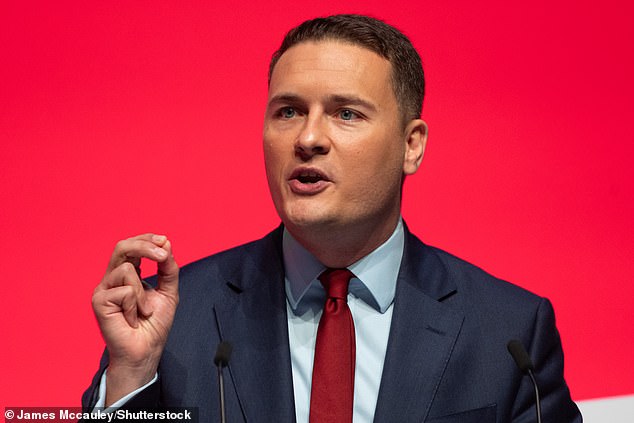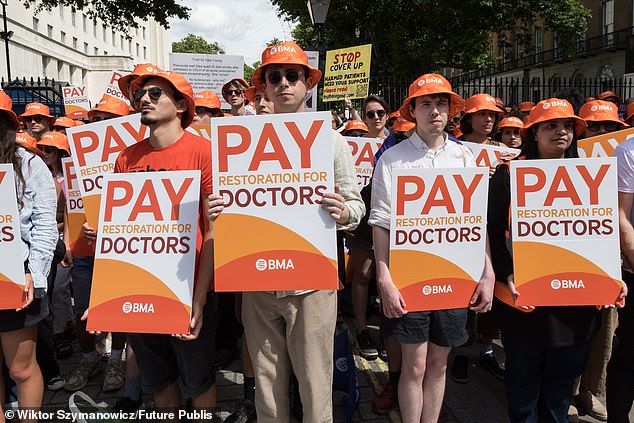GPs are wasting all the public support they have left by betraying us all: DR MARTIN SCURR
The worst of both worlds: that is the only way to sum up the scandalous decision by more than 8,500 GPs to vote for strikes ahead of negotiations with the government on new contracts.
The impact on patients will be immediate, at a time when they are already facing a terrible level of service. The impact on hospitals is likely to be even worse, as patients seeking treatment for minor ailments gather in A&E departments or dial 999, adding to the pressure on an ambulance service already stretched to breaking point.
It is counterproductive and unnecessary. GPs, who have become increasingly unpopular since the massive disruption caused by Covid, are wasting all the public support they have left. As a retired GP, this makes me genuinely angry.
GPs can now choose from a range of actions drawn up by the British Medical Association (BMA), several of which are downright dangerous to patients, despite claims by the doctors’ union that by implementing them GPs can ‘support a safe service for their patients and their practice team’.
The impact on patients will be immediate, at a time when they are already facing serious service demands.
The most alarming of these proposals, and the one at the top of the BMA’s list, is to ‘limit daily patient contacts’ to a ‘safe maximum of 25’. That might seem like a reasonable ceiling, when you imagine that it means 25 old-fashioned consultations averaging ten minutes each – that’s more than four hours of work.
But in reality, it could be as many as 25 repeat prescriptions, all of which can be completed in just a few minutes with the stroke of a pen.
Other proposed forms of action include doctors ceasing to support voluntary services and refusing to sign up to enhanced online services that make it easier for patients to obtain information and support over the internet. These are all serious steps, calculated to cause major disruption to the NHS, at an unspeakable cost to the public. They should be a weapon of last resort, not an opening salvo.
If GPs instead focused on explaining their concerns, they could gain broad public support.
A key BMA demand is that changes are made to the current referral system, where for example patients with suspected cancers are referred to specialist consultants. It is wrong that this system has an upper limit, as it currently does, with referrals being rationed.
The new government has been in power for less than a month. The BMA is in a strong negotiating position, as it clearly has the overwhelming support of its members. The vote alone should be enough to make Health Minister Wes Streeting realise that he has no choice but to make concessions.
But the BMA is acting as if the Department of Health has sworn never to surrender. GPs are being warned that the fight could last for months, with strikes continuing long after Christmas. It makes no sense.
The Labour Party is largely responsible for this crisis, because of the shocking speed with which it caved in to junior doctors, who last week received a 22.3% pay rise.

Health Minister Wes Streeting should realise that he has no choice but to make concessions. But Labour is largely responsible for this crisis by giving in to young doctors
The government has already committed to increasing GP salaries by 6 per cent, but this is clearly out of line with the BMA – despite the fact that the average salary of a full-time GP partner is more than £150,000 a year, with some earning up to £700,000, according to figures from the NHS Business Services Authority.
Getting an appointment with a GP is stressful and frustrating enough: it usually involves an 8am phone call as time slots become available, often two weeks in advance. Elderly and disabled patients, often those who need the service most, are automatically at a disadvantage.
Public distrust of GPs will certainly increase if we see doctors working in the NHS to govern, but also moonlighting in private practice. This will reinforce the perception of a two-tiered health service, where those who can afford to pay extra get preferential treatment.
In Britain, a situation has now arisen that would have been unthinkable a few years ago: patients see the health service as a kind of lottery: to get an appointment with the GP, you either have to be lucky or rich enough to buy a golden ticket.

The new Labour government last week awarded a 22.3 percent pay rise to junior doctors
This leads to a breakdown of the unwritten contract between public and healthcare workers, with many people feeling that they have to manipulate and cheat the system in order to receive treatment at all.
Not so long ago, the ambulance service was seen by almost everyone as a lifeline for genuine emergencies such as strokes and heart attacks. These days, I often hear stories of people calling 999 and exaggerating their symptoms to get a paramedic to come for a trivial injury such as a sprained ankle.
The result is long lines of ambulances in front of the ER, unable to unload patients, while people with life-threatening conditions have to wait for hours.
If this gets much worse, we will effectively lose the NHS as we know it. GPs are taking a shocking and pointless risk, by bringing the whole system closer to complete destruction, when they are already in a winning position.
“Shameful” is too weak a word. They betray us all.
